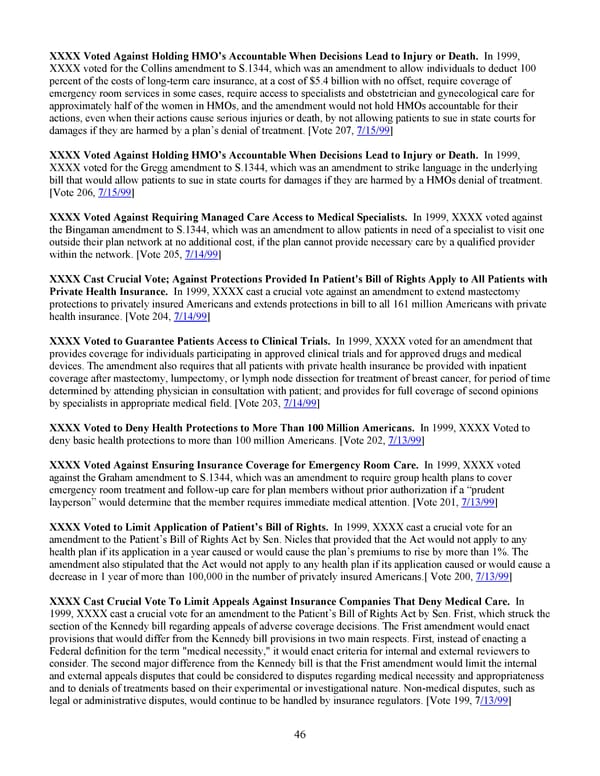XXXX Voted Against Holding HMO’s Accountable When Decisions Lead to Injury or Death. In 1999, XXXX voted for the Collins amendment to S.1344, which was an amendment to allow individuals to deduct 100 percent of the costs of long-term care insurance, at a cost of $5.4 billion with no offset, require coverage of emergency room services in some cases, require access to specialists and obstetrician and gynecological care for approximately half of the women in HMOs, and the amendment would not hold HMOs accountable for their actions, even when their actions cause serious injuries or death, by not allowing patients to sue in state courts for damages if they are harmed by a plan’s denial of treatment. [Vote 207, 7/15/99] XXXX Voted Against Holding HMO’s Accountable When Decisions Lead to Injury or Death. In 1999, XXXX voted for the Gregg amendment to S.1344, which was an amendment to strike language in the underlying bill that would allow patients to sue in state courts for damages if they are harmed by a HMOs denial of treatment. [Vote 206, 7/15/99] XXXX Voted Against Requiring Managed Care Access to Medical Specialists. In 1999, XXXX voted against the Bingaman amendment to S.1344, which was an amendment to allow patients in need of a specialist to visit one outside their plan network at no additional cost, if the plan cannot provide necessary care by a qualified provider within the network. [Vote 205, 7/14/99] XXXX Cast Crucial Vote; Against Protections Provided In Patient's Bill of Rights Apply to All Patients with Private Health Insurance. In 1999, XXXX cast a crucial vote against an amendment to extend mastectomy protections to privately insured Americans and extends protections in bill to all 161 million Americans with private health insurance. [Vote 204, 7/14/99] XXXX Voted to Guarantee Patients Access to Clinical Trials. In 1999, XXXX voted for an amendment that provides coverage for individuals participating in approved clinical trials and for approved drugs and medical devices. The amendment also requires that all patients with private health insurance be provided with inpatient coverage after mastectomy, lumpectomy, or lymph node dissection for treatment of breast cancer, for period of time determined by attending physician in consultation with patient; and provides for full coverage of second opinions by specialists in appropriate medical field. [Vote 203, 7/14/99] XXXX Voted to Deny Health Protections to More Than 100 Million Americans. In 1999, XXXX Voted to deny basic health protections to more than 100 million Americans. [Vote 202, 7/13/99] XXXX Voted Against Ensuring Insurance Coverage for Emergency Room Care. In 1999, XXXX voted against the Graham amendment to S.1344, which was an amendment to require group health plans to cover emergency room treatment and follow-up care for plan members without prior authorization if a “prudent layperson” would determine that the member requires immediate medical attention. [Vote 201, 7/13/99] XXXX Voted to Limit Application of Patient’s Bill of Rights. In 1999, XXXX cast a crucial vote for an amendment to the Patient’s Bill of Rights Act by Sen. Nicles that provided that the Act would not apply to any health plan if its application in a year caused or would cause the plan’s premiums to rise by more than 1%. The amendment also stipulated that the Act would not apply to any health plan if its application caused or would cause a decrease in 1 year of more than 100,000 in the number of privately insured Americans.[ Vote 200, 7/13/99] XXXX Cast Crucial Vote To Limit Appeals Against Insurance Companies That Deny Medical Care. In 1999, XXXX cast a crucial vote for an amendment to the Patient’s Bill of Rights Act by Sen. Frist, which struck the section of the Kennedy bill regarding appeals of adverse coverage decisions. The Frist amendment would enact provisions that would differ from the Kennedy bill provisions in two main respects. First, instead of enacting a Federal definition for the term "medical necessity," it would enact criteria for internal and external reviewers to consider. The second major difference from the Kennedy bill is that the Frist amendment would limit the internal and external appeals disputes that could be considered to disputes regarding medical necessity and appropriateness and to denials of treatments based on their experimental or investigational nature. Non-medical disputes, such as legal or administrative disputes, would continue to be handled by insurance regulators. [Vote 199, 7/13/99] 46
 HRC vote skeleton Page 52 Page 54
HRC vote skeleton Page 52 Page 54